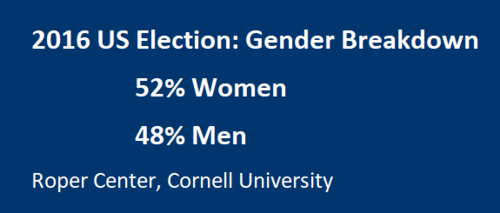The Far Right and Women’s Rights: Independent
The Far Right and Women’s Rights: Independent
 Read the article from the Independent about the rise of far-right politicians around the world and the erosion of human and women’s rights.
Read the article from the Independent about the rise of far-right politicians around the world and the erosion of human and women’s rights.
Maya Oppenheim is the Independent’s women’s correspondent. She covers news, social policy and global stories from a women’s angle – with a particular focus on issues of domestic violence, sexual assault, gender-based violence, abortion, and period poverty.
Read about demographic breakdowns for the 2016 US presidential Election from the Roper Center for Public Opinion Research at Cornell University.
Read about voter registration and turnout from women and men from the Center for American Women and Politics at Rutgers University: “In every presidential election since 1980, the proportion of eligible female adults who voted has exceeded the proportion of eligible male adults who voted.”